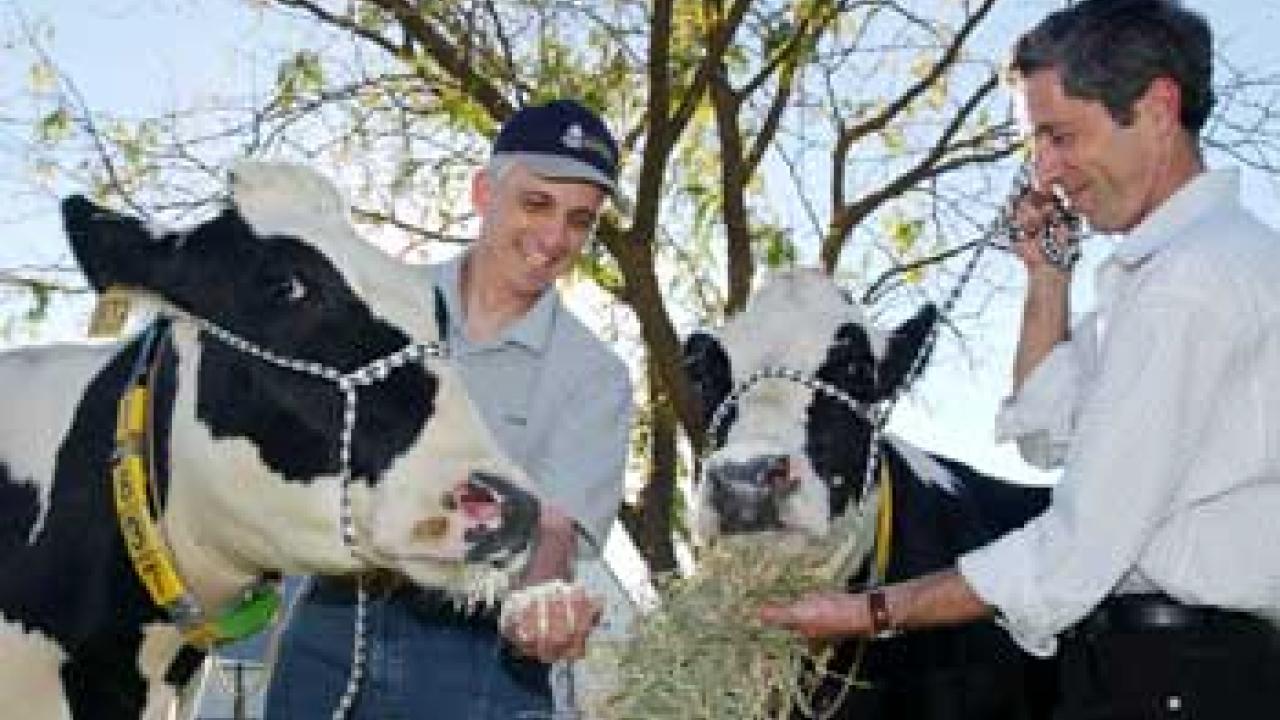A new cattle-feed supplement, which dramatically boosts the content of unsaturated fatty acids over saturated fats in cows' milk, has been developed by researchers at the University of California, Davis.
The new supplement, based on naturally occurring proteins, promises to significantly improve the healthfulness of milk and provide dairy-food processors with the ability to modify various food qualities, such as the spreadability of butter and the flavor of cheese.
"We are excited about the health benefits this new technology will offer to consumers and the options it will give to dairy-food processors," said Moshe Rosenberg, a professor and dairy specialist in the Department of Food Science and Technology.
Rosenberg developed the new feed supplement along with Ed DePeters, a UC Davis animal science professor who specializes in the nutrition of dairy cows. The University of California funded the research and has filed both United States and international patent applications on the newly discovered feed supplement.
Milk, butter and meats have long been known to contain high levels of saturated fats. Because saturated fats have been implicated in contributing to a higher risk of cardiovascular disease and high cholesterol in humans, there has been a great deal of interest during the past 30 years in reducing the amount of saturated fat in cows' milk and meat.
Cows commonly eat a variety of plant-based feeds, including hay, corn, cotton seed, and almond hulls, all of which contain varying amounts of vegetable oils. These vegetable oils are naturally high in unsaturated fats; and one would expect cows' milk to also contain more unsaturated fats than saturated fats.
Somewhere between mouth and milk, however, the unsaturated fats found in the feed are transformed into saturated fats. Researchers discovered years ago that microorganisms that live in the rumen--the largest of four compartments in the cow's stomach--are the culprits responsible for converting unsaturated fats into saturated fats.
"The rumen is a large anaerobic fermentation vat. These microbes metabolize the unsaturated fats as they pass through the rumen, which involves converting the unsaturated fatty acids into saturated fats in a process known as 'biohydrogenation'," explained DePeters. "Its been clear for decades that in order to reduce the saturated fats in milk and meat, we would have to protect the unsaturated dietary fats from these microbes in the rumen."
During the 1970s, efforts were made to protect the unsaturated fats against modification by mixing chemical additives with the feed. Those supplements, however, included toxic chemicals, such as formaldehyde, which were not permitted in the United States and some other countries. In the 1980s, other researchers attempted to prevent modification of unsaturated fats by mixing in soap-like formulations with the cattle feed. That technique had only limited success in preventing unsaturated-fat modification in the rumen.
Unlike the earlier methods, the supplement devised by Rosenberg and DePeters relies on proteins that occur naturally in milk and other foods, without using any synthetic chemicals. By taking advantage of the unique properties of proteins, the researchers were able to form complexes between those proteins and substances called lipids, which are high in unsaturated fatty acids.
These complexes protect the lipids against modification by the microorgnisms that live in the rumen. As a result, the unsaturated fats pass unmodified through the rumen; eventually enter the cow's intestine for digestion, where the unsaturated fatty acids are then available for absorption into the blood stream; and finally are presented to the mammary gland, where the milk is produced.
During feeding trials, the researchers mixed the supplement with the cows' normal feed. Within less than three days, they recorded as much as an 800 percent increase in the proportion of specific unsaturated fatty acids, such as linolenic acid, in the cows' milk.
The study involved more than 750 cow-days, with more than 1500 milk samples analyzed.
Although the supplement's effects have only been studied on the fatty-acid composition of milk, the researchers indicate that it might have similar benefits in reducing the level of saturated fats in meat.
"In addition, this same protein-based, rumen-protected supplement could be used as an efficient system for delivering bio-active compounds and medicines to cows and other animals," Rosenberg added.
Funding for this study was provided by a grant from UC Davis' Office of Research. Support was also provided through the California Agricultural Experiment Station.
Media Resources
Pat Bailey, Research news (emphasis: agricultural and nutritional sciences, and veterinary medicine), 530-219-9640, pjbailey@ucdavis.edu
Moshe Rosenberg, Food Science and Technology, (5300 752-4682, mrosenberg@ucdavis.edu
Ed DePeters, Animal Science, (530) 752-1263, ejdepeters@ucdavis.edu
